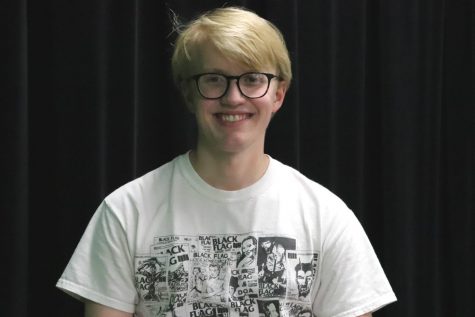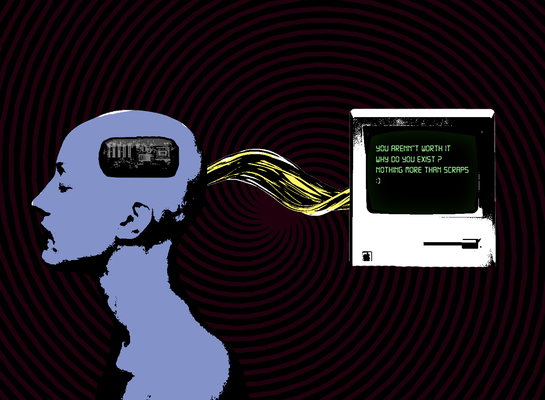Mental health coordinator shares her advice for staying healthy through hard times
Mental health is extremely important. What’s life without emotions, ups, downs, and especially, happiness? The ultimate goal to achieve happiness will always be a struggle. With good advice to anchor you down however, it may be easier to find.
Janine Wange is the Mental Health Coordinator and a counselor at Metea. In this interview, she provides her wisdom about the topics of mental clarity and life contentment. Knowing about self-care really matters, it’s a life skill that goes a longer way than most others. Answers to these questions can be difficult to find; take it from the professional.
What would you suggest as ways to combat self-hate and promote self-love?
“Figure out what you’re passionate about and be true to yourself. Doing things outside of yourself helps to get out of feeling so inward all the time. If you don’t have something that you’re passionate about, if you’re hanging out with people who are bringing you down, if you’re in an unsupportive environment…Getting involved and doing some things that bring joy to your life is a good suggestion for starters. Not everyone needs to talk to someone, but just for the normal ups and downs, do things that you love and be around people that are uplifting.”
What are your biggest pieces of advice regarding mental health/taking care of yourself/being a teenager?
“Don’t take yourself too seriously. At this age, a lot of people think that you have to do things perfectly or do certain things in general. A lot of the time, teens are looking for ways to build a resumé, but I think it’s more important to build a person. To build a person, you have to be true to who you are. It’s okay to make mistakes, some of the funniest stories I have about my life are when I totally failed. Sometimes mistakes lead you in a direction that maybe you weren’t planning for, but it’s a good direction. It’s maybe the way that your life was meant to go. Take things as they come, have some fun. Usually if you work hard, things work out in the end. If you work hard, you let people advise you, you seek help, things work out and you also learn from your failures. It’s okay to fail.”
Are there any specific coping methods you recommend in general?
“A good coping strategy to get through the day could be having a distraction. If you’re starting to get anxious and your mind is getting out of control and you’re going down this rabbit hole of negative thinking, try to distract yourself. Distraction could be as simple as reading a book that you love/enjoy, doing word hunt puzzles, or other things you can have in your back pocket that you can pull out and just do if you need to get refocused in the moment. Another distraction could be playing games in your head [when you’re in school] such as the alphabet game; for example, girl’s names…so “A” is for Ashley, “B” is for Beth, and so on. For panic attacks, four square breathing can be really helpful, so you breathe in for four seconds, hold for four seconds, and exhale for four seconds. It’s a good breathing technique to get your heart to slow down which can, in turn, help/impact your mind as well. It gets your body to calm itself down. There a lot of other different strategies. Some people bring self-soothe kits around school– you’d have things in there that help you ground yourself. Mindfulness, grounding yourself, and being in the moment is a huge thing. Sometimes we tell kids to bring sour candy to school because that can bring you back to the present or something like this [hand sanitizer] which has a nice smell; something that’s calming to have with you that helps you before you get into crisis mode and before you need to leave class or start crying, etc.”
What advice would you give in regard to how to stop comparing yourself and your life?
“It’s all about — I think it’s hard to do for many people — but it’s about being true to what you want; trying to get rid of all the extraneous voices and variables in your life and trying to figure out what you really are passionate about. It’s easy to compare if you don’t have an anchor grounded in who you are and what makes you excited and joyful about life. You have to figure out what your thing is, and once you get involved in that, then the comparisons go away. It is difficult in certain circumstances because there are family pressures and cultural pressures to be a certain way, but really, you just have to figure out a way to say ‘this is who I am and it’s okay if ‘so and so’ says I should be a certain way, but I’m good with who I am’”
What do you believe are some keys to living a mentally healthy life?
“Every stage in your life is different. But no matter what it’s about finding balance. I think people who are too extreme in one way or another are not as happy of people. Finding the right amount of things, such as the right amount of exercise or meditation. Figuring out who you are and what your day needs to look like to feel good–not what other people do– but what you want. Surrounding yourself with people who are good for you; making sure you have people in your life that uplift you, you know, and that’s a common conversation that we have in high school because you’re constantly reinventing who your friends are, at least some people are. Also, being forgiving to yourself, being able to laugh at failures and not take yourself so seriously and be lighthearted. Because we all fail. For example, I wanted to get here at 7:00 this morning, but I got here at 7:10. You know, if you beat yourself up about tiny failures like that you’ll constantly feel down about yourself. You’ve got to figure out balance and how to make your life work. You know, if you’re doing homework for 10 hours a day…that’s just too much. You’ve got to have some joy; you have to make time for friends. You’ve got to make time for family. If, you’re spiritual, make time for that. Make time for the things that are important to you.”
What are some of the biggest benefits of counseling/therapy in your opinion?
“I think sometimes it’s just having someone who’s unbiased to listen to you. Because if you go to your parents or your friends, they know you so well that there’s kind of a bias and they might want to jump in and help you too fast instead of really taking it all in and listening to it neutrally. Also, there’s that trained ear; someone who might know techniques that would fit for your situation and might help you. So many times I’ve had kids tell me when their parents know they’re struggling, they just want to come in and save them and that’s natural. But sometimes, you need to figure it out on your own with someone to help brainstorm or think through ideas. So I think it’s good to just have that unbiased, trained person who can help hold your hand as you need it, and then let you be independent as you’re ready.”
What is a universal saying/phrase that is close to your heart?
“Don’t live in the “should”s. Thinking about what you “should” do according to others will only lead to comparison, self-doubt, and living a life that’s not true to yourself–that’s not YOU. If you live in “should”s, you’re going to be very disappointed with your life.”
Mrs. Wange and Mrs. Bane are sponsors of Mental Health Matters Club. If you are passionate about mental health and reducing its stigma, come by one of the meetings and join the discussion.
If you need help or just want to talk to someone, reach out to the MVHS counselors. No matter what phase of life someone is experiencing, there will be guidance; you are not alone.
Naperville/Aurora Area Crisis Text Line: Text REACH to 741741

Harrison Linden is a senior in his first year of journalism as a graphics designer. He spends way too much time on activities like drawing, painting, photography,...


